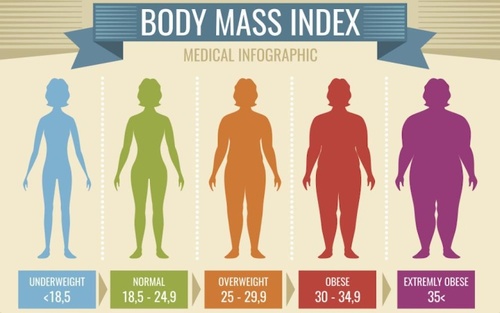

Body mass index (BMI) is a calculation that is sometimes used in healthcare settings as an indirect method to determine a person's body weight category. This BMI calculator can help you learn what this measurement means and how it relates to your health and fitness.
What Does BMI Measure?
BMI is a measurement that takes into account your height, and weight to produce a calculation. This calculation is a measurement of your body size and can be used to determine how your body weight is related to your height. It is a method of determining whether you may be underweight, average weight, overweight, or obese, but it has flaws.
BMI is not a diagnostic tool nor is it a measurement of body fat percentage. A high BMI may or may not be an indicator of high body fat, but it doesn't necessarily mean that a person is overweight or obese and it alone is not a direct indicator of health.
In some populations, BMI has been found to be a fairly reliable indicator of body fat measures. But the calculation is less effective in other groups, such as bodybuilders and older adults. There are other methods that are more accurate in estimating body fat.
How BMI Is Measured
Your BMI is calculated using your height and weight. It can be a starting point for understanding the way your body fat may impact your overall health. You can use the number along with other health measurements to begin a conversation with your healthcare provider about ways to reduce your risk for disease and improve your overall wellness.
Imperial
Formula: weight (lb) / [height (in)]2 x 703
Example: weight = 150 lbs, height = 5’5” (65")
BMI calculation: [150 / (65)2] x 703 = 24.96
Metric
Formula: weight (kg) / [height (m)]21
Example: weight = 68 kg, height = 165 cm (1.65 m)
BMI calculation: 68 / (1.65)2 = 24.98
Note that BMI is interpreted differently in children. Growth charts and percentiles are used. If children are at or above the 95th percentile of children their age, they are considered obese.
For adults, BMI results are interpreted as follows.
BMI Measurement Weight Category
Below 18.5 Underweight
18.5 – 24.9 Normal weight
25.0 – 29.9 Overweight
30.0 and above Obese
Health Risks Related to High BMI
The reason BMI is used for screening the health of the general population is due to the correlation between being overweight or obese and having certain health problems. People who are overweight or obese have an increased risk for:2
Coronary heart disease
Hypertension
Osteoarthritis
Sleep apnea and respiratory problems
Some cancers
Stroke
Type 2 diabetes
Health Risks Related to Low BMI
While a high BMI may be an indicator for increased health risk, low BMI can also be indicative of health issues. People who are underweight according to the BMI scale can be predisposed to:
Cardiovascular disease
Depression
Difficulty conceiving (in women)
Dry skin
Hair loss
Irregular menstruation (in women)
Nutrient deficiencies
Osteoporosis
Poor immune system
Benefits of a Normal BMI
Maintaining a normal BMI (18.5 to 24.9) comes with many benefits, including limiting your risk to all of the above-listed health concerns. Not only are you less likely to have high blood pressure, heart disease, or diabetes, but maintaining a normal BMI can also help with better sleep, improved circulation, and even better energy throughout the day.
Bias and Limitations
The original index was developed to create statistics about population samples using European men as a baseline. It has since been used to assess people of all ages and races, perpetuating the creators' bias that the male, European body was the ideal body and measure of a person's fit-ness.4
There are several known limitations of body mass index. First, the calculation does not take age or gender into account.
Men tend to carry more muscle than women and this is not factored into the equation. BMI does not distinguish between muscle mass and fat mass in its calculation. Also ethnic and race variations are not considered.
While BMI can be a tool doctors use to understand your health status better, it is not a solitary diagnostic tool. When measuring your body fat composition, physicians also take into account your diet, lifestyle, level of physical activity, family history and genetics, as well as other health screenings.
Fitness, especially, is very important. Researchers have found that being fit negates the adverse effects of excess body fat, as well as other traditional cardiovascular risk factors, including obesity, metabolic syndrome, type 2 diabetes mellitus, and hypertension.
Updated on October 17, 2022
Medically reviewed by
Marisa Moore, RDN, MBA
HEALTHY Body and Mind
